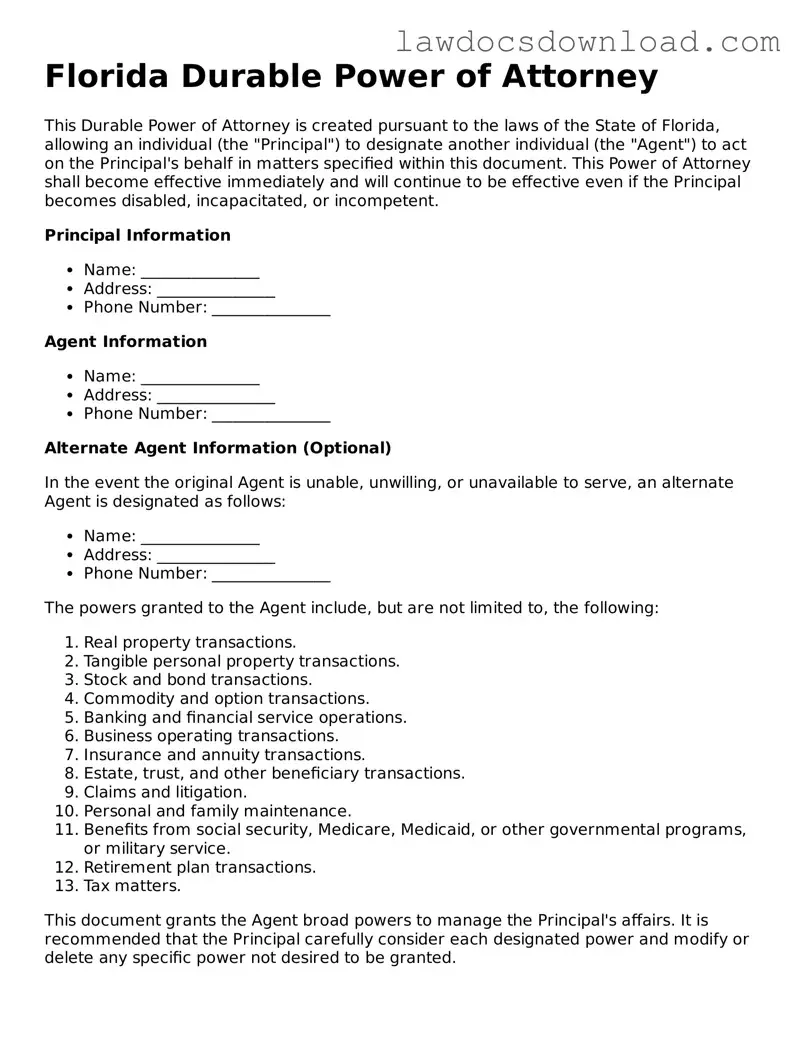Florida Durable Power of Attorney
This Durable Power of Attorney is created pursuant to the laws of the State of Florida, allowing an individual (the "Principal") to designate another individual (the "Agent") to act on the Principal's behalf in matters specified within this document. This Power of Attorney shall become effective immediately and will continue to be effective even if the Principal becomes disabled, incapacitated, or incompetent.
Principal Information
- Name: _______________
- Address: _______________
- Phone Number: _______________
Agent Information
- Name: _______________
- Address: _______________
- Phone Number: _______________
Alternate Agent Information (Optional)
In the event the original Agent is unable, unwilling, or unavailable to serve, an alternate Agent is designated as follows:
- Name: _______________
- Address: _______________
- Phone Number: _______________
The powers granted to the Agent include, but are not limited to, the following:
- Real property transactions.
- Tangible personal property transactions.
- Stock and bond transactions.
- Commodity and option transactions.
- Banking and financial service operations.
- Business operating transactions.
- Insurance and annuity transactions.
- Estate, trust, and other beneficiary transactions.
- Claims and litigation.
- Personal and family maintenance.
- Benefits from social security, Medicare, Medicaid, or other governmental programs, or military service.
- Retirement plan transactions.
- Tax matters.
This document grants the Agent broad powers to manage the Principal's affairs. It is recommended that the Principal carefully consider each designated power and modify or delete any specific power not desired to be granted.
The effectiveness of this Durable Power of Attorney is contingent upon it being executed in compliance with the requirements of the State of Florida. The Principal acknowledges that this document can be revoked by the Principal at any time, provided the Principal is competent. To revoke, the Principal must provide written notice to the Agent.
By signing this document, the Principal and Agent acknowledge that they understand and agree to the terms and conditions set forth in this Durable Power of Attorney.
Principal's Signature: _______________ Date: _______________
Agent's Signature: _______________ Date: _______________
Alternate Agent's Signature (If Applicable): _______________ Date: _______________
Witness #1 Signature: _______________ Date: _______________
Witness #2 Signature: _______________ Date: _______________
This Durable Power of Attorney must be signed in the presence of two witnesses, who are not the Agent or the Alternate Agent, and notarized to be valid under the laws of the State of Florida.
Notary Acknowledgment
State of Florida
County of _______________
On this day of _______________, 20__, before me, a Notary Public, personally appeared _______________, known to me (or satisfactorily proven) to be the person(s) whose name(s) is/are subscribed to the within instrument and acknowledged that he/she/they executed the same for the purposes therein contained.
In witness whereof, I hereunto set my hand and official seal.
Notary Public (Seal): _______________
My Commission Expires: _______________

